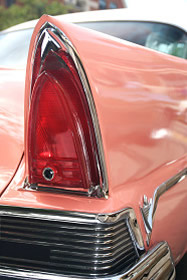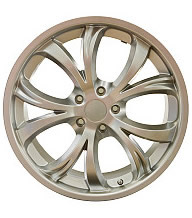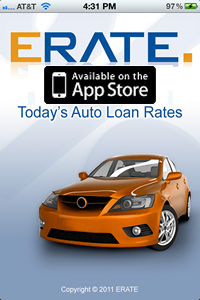Automobile Financing
Autos: Leases & Loans
by Nancy Osborne, COO of ERATE®
Buying a car is probably your second biggest financial decision after buying a house.
That being said, you'll want to do this right. You want to make the best financing decision possible given your personal financial circumstances.

Step One: Negotiate the Price
Your first question will likely be should I lease or buy my car? In either case, whether you lease or buy, the whole process begins with negotiating the price of what will hopefully be your “dream car”. The best way to negotiate price is to do your homework on the web (or at the library) before hitting the dealership and to price the same vehicle with all the bells and whistles (aka options) you want at several dealerships. Don't
object to playing one dealer off the other in an attempt to secure the best deal possible. Having several dealers competing with each other for your business is the best way to secure an optimal price.
First and foremost when negotiating the price, do not accept any of the extras the salesperson at the dealership will try to off-load on you. These extras only increase the amount of debt you are taking on and may only serve to improve the salesperson's commission. Many desired options have become standard equipment today so consider each one carefully and make a decision that serves your best interest. Also worth noting is the fact that dealers make money directly from the manufacturer that the sales person on the dealership floor may not have access to. There are special dealer holdbacks and incentives that you may have to speak directly to a sales manager to take advantage of or to benefit from.
Buyers may waste too much time emphasizing sticker price however the real savings comes from negotiating the financing terms.
Step Two: Deciding to Lease or Buy
WHAT YOU SHOULD KNOW ABOUT LEASING
Leasing Pros:
Leasing has risen in popularity in recent years and now comprises over 30% of all new vehicle transactions. This popularity is due in large part to the favorable tax treatment afforded leasing vs. owning when a car is used for business purposes. A lease can permit a business user to write off more of the cost of the vehicle than is permitted through ownership. Another vitally important consideration when leasing, is that it eliminates the sales tax which is typically a sizeable chunk of change.
Is Leasing a Car Right for You?
Leasing can work for you if you have your eye on a car that is more expensive than you could otherwise pragmatically afford and if you are someone who prefers driving a new vehicle frequently (i.e. every 2-4 years). Leasing can also result in a lower monthly payment than purchasing the vehicle because you are essentially renting the car with an option to purchase it down the line. Leasing is also a good idea for those able to take advantage of the business tax perks mentioned previously. Leasing can be a maintenance friendly option for those who do not like to worry about following a service schedule. This can be delegated to the dealership with a nominal fee added to your lease payment, so that the dealer will perform the maintenance for you, as it is in their best interest to keep the vehicle running smoothly since they will need to sell the vehicle at a future time. This will keep it hassle free for you, the lessee, who will likely be provided with a loaner vehicle while your leased car is in for service and repairs.
Leasing Cons (May Not Be for You If…..)
You are concerned about saving money in the long run. Most leases result in a greater cash outflow in the end than if you had actually purchased and ultimately sold the vehicle yourself. If you elect to trade the car in before the term of the lease is up, the balance due on the lease contract can be sizeable, though not technically referred to as a pre-payment penalty.
Is Leasing Ever Less Costly Than Purchasing?
There are several instances where this could be the case. The first is when the car's residual value (the car's value at the end of the lease period) is lower than the purchase price the lessor (the dealer) guaranteed and if the lessor will let you purchase the vehicle at that lower price.
The second case in favor of a lease occurs when the lease has been subsidized by a dealer. This results in cheaper financing for you by leasing than you could otherwise obtain if you sought financing to purchase the vehicle. If your lease permits you to purchase the vehicle at the end of the lease for a guaranteed or residual value (the car's value at the end of the lease period) then the subsidized rate can be calculated and you can make the comparison.
Types of Leases:
The leasing process is a fairly simple one. One month's payment is made up front in addition to a refundable deposit, usually equivalent to another month's payment and you are ready to drive off with your leased vehicle. The dealer may require a down payment (unusual today) but typically around 10% of the agreed upon purchase price. When the lease expires the lessee has one of two options:
Option One – Drop off the car with the dealers and owe nothing. This is referred to as the closed-end lease. This is the most popular lease though it is not legal in all states. Closed-end leases are based on the theory that the annual mileage placed on a vehicle can be averaged and that wear and tear is predictable as well. Therefore a vehicle's value at the end of the lease term can be pre-determined at the time the lease is initiated. This value is also called the car's residual value.
Option Two – Buy the car. This is an open-end lease. This lease will cost less per month but your final cost will be determined by what the car's re-sale value is at the end of the lease. Should it sell for more than the lessor (the dealer) anticipated then the lessee (you) may be entitled to a refund. If the vehicle sells for less than anticipated, the lessee (you again) will pay the difference. This difference is typically capped, usually a maximum of three monthly payments.
A Lease Alternative to Consider:
Many Credit Unions offer purchase loans that mimic or function like a lease. A buyer is not required to have a down payment or make a security deposit. There is no fee to dispose of the vehicle when you turn it back into the dealer. Yet the auto loan will still provide the advantage of a lower overall monthly payment than could otherwise be secured through a purchase loan. The Credit Union provides a selection of options at the end of the term: 1) Keep the car and pay off the loan or refinance the balance. 2) Sell the car and pay off the loan balance. 3) Trade the car in and pay off the balance. 4) Turn the car over to the Credit Union and the balance is paid.
Lastly, Rules to Follow if You Do Decide to Lease:
Rule #1 Negotiate price just as you would on a purchased vehicle. Review all payments, fees and charges associated with the lease. Keep the dealer compliant with the “Truth in Leasing” law, it is your right to know and understand these terms.
Rule #2 Exercise your timing wisely. A dealer typically builds in one full year of depreciation into the first year's lease. Therefore if you initiate your lease at the end of a model year, you may end up paying for one full year's depreciation on your leased vehicle in just a few months' payments.
Rule #3 The optimal lease term is three years, it should be your maximum term. Taking all unknown variables into consideration, that is the longest time frame with which you want to be obligated to the vehicle. Also, if you keep the vehicle longer than three years you may end up paying for repairs on a vehicle you don't own. Note: Dealers are now pushing short term leases because the warranties directly from manufacturers are typically of a similar time frame.
Rule #4 Keep all vehicle maintenance records. Always have the vehicle serviced by a reputable mechanic and maintain all records. The dealer will likely ask for these records at the time the vehicle is returned at the end of the lease.
Rule #5 The lease will refer to the normal use and wear and tear by the lessee, but you should ask exactly what is considered normal by the dealer. If your use exceeds the dealer's definition it will cost you severely when you turn in the vehicle. Don't assume, ask up front.
Rule #6 Watch out for early termination fees. Should you decide to turn in the vehicle before the lease expires, the dealer will hit you with a fee. How this fee is calculated can be determined at the time the lease is initiated. Make sure the dealer assesses no more than actual services and depreciation rendered.
Rule #7 Know your driving habits. How many miles on average do you anticipate driving per year? If you guess wrong, it will cost you. Be as accurate as possible and better that you over-estimate rather than under-estimate. If you end up exceeding the agreed upon mileage, the dealer could sock you with an additional cost-per-mile exceeded charge. Note: If you drive an average of 10-12,000 miles per year, you may want to negotiate a break on your lease as low mileage on the vehicle at the end of the lease term could improve the residual (or turn in) value for the dealer at the end.
Rule #8 Be aware of your auto insurance responsibility. It is yours alone and not the dealers. Check with your agent or carrier to be safe and in compliance with your lease.
In addition, if your leased vehicle is destroyed or stolen during the term of the lease, that likely qualifies as an early termination by the dealer. Although the value of the car is covered by your insurance, you could still owe the dealer money on the lease. Gap Insurance will cover this unforeseen risk for you, be sure you get it.
Lastly, be aware of any restrictions which would prohibit you from taking the vehicle to another state if moving is a possibility for you.
 Nancy Osborne has had experience in the mortgage business for over 20 years and is a founder of both ERATE, where she is currently the COO and Progressive Capital Funding, where she served as President. She has held real estate licenses in several states and has received both the national Certified Mortgage Consultant and Certified Residential Mortgage Specialist designations. Ms. Osborne is also a primary contributing writer and content developer for ERATE.
Nancy Osborne has had experience in the mortgage business for over 20 years and is a founder of both ERATE, where she is currently the COO and Progressive Capital Funding, where she served as President. She has held real estate licenses in several states and has received both the national Certified Mortgage Consultant and Certified Residential Mortgage Specialist designations. Ms. Osborne is also a primary contributing writer and content developer for ERATE.
"I am addicted to Bloomberg TV" says Nancy.
Other related articles:
Automotive Loans: Trading in a Car
Automotive Loans: Buying Vs Leasing
Auto Loans Advice: New Cars & Used Cars

Automotive Loans: Trading in a Car
Automotive Loans: What Laws Protect Car Buyers?
Automotive Loans: Trade In or Sell a Car?
Automotive Loans: Is Zero Percent Financing Really Possible?
Automotive Loans: Determining a Down Payment
Automotive Loans: The Truth About "Add-Ons"
Automotive Loans: Top 5 Mistakes When Buying a Car
Automotive Loans: Shopping Online
Automotive Loans: Dealer Incentives to Buy
Automotive Loans: Car Buying Incentives
Automotive Loans: Should You Buy New or Used?
Automotive Loans: What to Know About Interest Rates
Automotive Loans: Negotiating a Loan with a Dealer
Automotive Loans: How Much Car Can You Afford?
Automotive Loans: Understanding Typical Loan Language
Automotive Loans: Types of Financing
Automotive Loans: Buying Vs Leasing
Automotive Loans: Applying for a Car Loan

Buying a Car: Standard and Extended Warranties
Car Buying: Financing Background and Steps
Leasing a Car: Two Types of Leases - Closed & Open
Buying a Used Car: Two Options
Buying a Car: 5 Steps to Find the Perfect Deal
Automobile Buying/Financing

5 Steps to Find the Perfect Car
Auto loan defaults to rise 7 percent in 2010
Auto Show Season Tips for Buyers
When is the Best Time to Buy a New Car?
Making a Vehicle Purchase? Enjoy These Helpful Tips
Chances are, your next car will be used. Drive a hard bargain
What your car is really saying
2012 President's Day auto sales among best ever
Special Report: Hitting the Brakes on Auto Dealer Loans
Auto Insurance
Buying Ins - Shopping for Insurance
Best Car Insurance Plan for You


